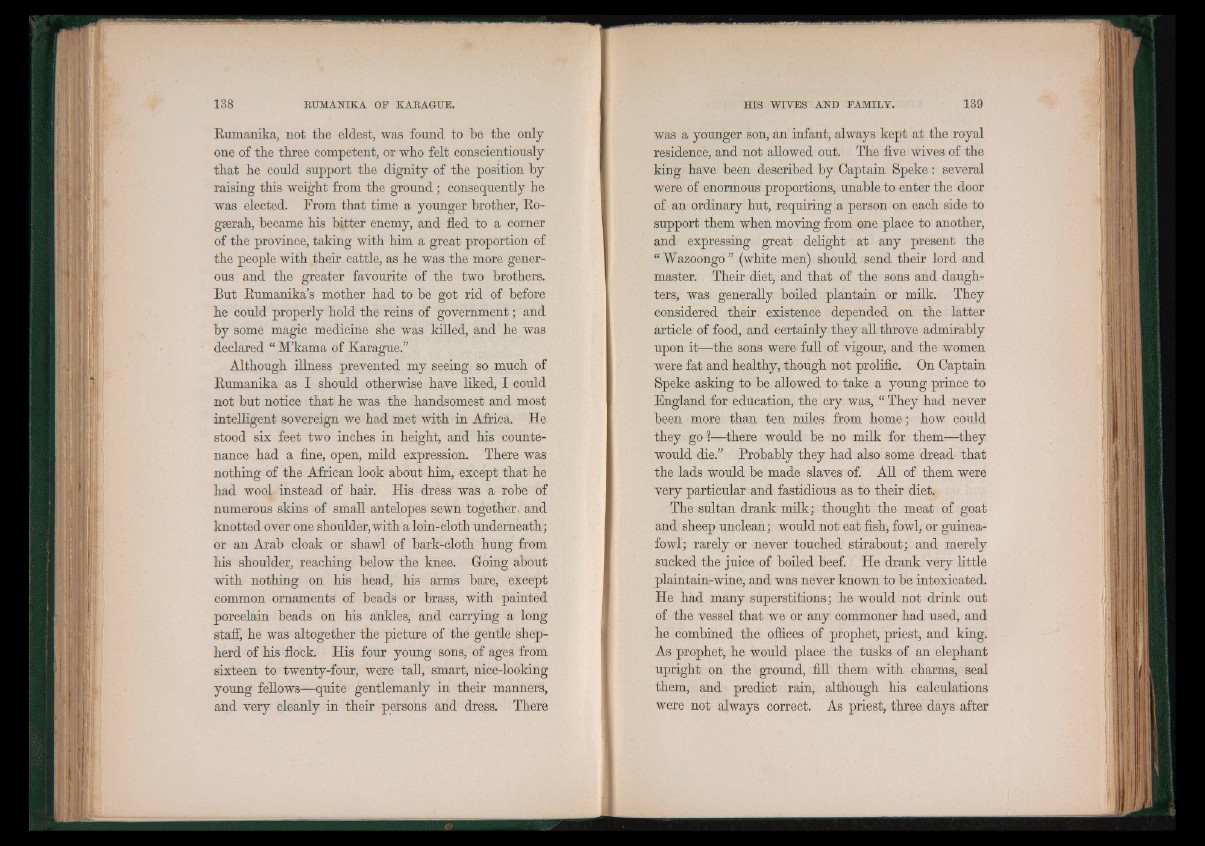
138 RUMANIKA OP KARAGUE.
Rumanika, not tie eldest, was found to be the only
one of the three competent, or who felt conscientiously
that he could support the dignity of the position by
raising this weight from the ground; consequently he
was elected. From that time a younger brother, Ro-
gserah, became his bitter enemy, and fled to a comer
of the province, taking with him a great proportion of
the people with their cattle, as he was the more generous
and the greater favourite of the two brothers.
But Rumanika’s mother had to be got rid of before
he could properly hold the reins of government; and
by some magic medicine she was killed, and he was
declared “ M’kama of Karague.”
Although illness prevented my seeing so much of
Rumanika as I should otherwise have liked, I could
not but notice that he was the handsomest and most
intelligent sovereign we had met with in Africa. He
stood six feet two inches in height, and his countenance
had a fine, open, mild expression. There was
nothing of the African look about him, except that he
had wool instead of hair. His dress was a robe of
numerous skins of small antelopes sewn together, and
knotted over one shoulder, with a loin-cloth underneath;
or an Arab cloak or shawl of bark-cloth hung from
his shoulder, reaching below the knee. Going about
with nothing on his head, his arms bare, except
common ornaments of beads or brass, with painted
porcelain beads on his ankles, and carrying a long
staff, he was altogether the picture of the gentle shepherd
of his flock. His four young sons, of ages from
sixteen to twenty-four, were tall, smart, nice-looking
yon rig fellows—quite gentlemanly in their manners,
and very cleanly in their persons and dress. There
HIS WIVES AND FAMILY. 139
was a younger son, an infant, always kept at the royal
residence, and not allowed out. The five wives of the
king have been described by Captain Speke: several
were of enormous proportions, unable to enter the door
of an ordinary hut, requiring a person on each side to
support them when moving from one place to another,
and expressing great delight at any present the
“ Wazoongo ” (white men) should send their lord and
master. Their diet, and that of the sons and daughters,
was generally boiled plantain or milk. They
considered their existence depended on the latter
article of food, and certainly they all throve admirably
upon it—the sons were full of vigour, and the women
were fat and healthy, though not prolific. On Captain
Speke asking to be allowed to take a young prince to
England for education, the cry was, “ They had never
been more than ten miles from home ; how could
they go ?—there would be no milk for them—they
would die.” Probably they had also some dread that
the lads would be made slaves of. All of them were
very particular and fastidious as to their diet.
The sultan drank milk; thought the meat of goat
and sheep unclean; would not eat fish, fowl, or guinea-
fowl; rarely or never touched stirabout; and merely
sucked the juice of boiled beef. He drank very little
plaintain-wine, and was never known to be intoxicated.
He had many superstitions; he would not drink out
of the vessel that we or any commoner had used, and
he combined the offices of prophet, priest, and king.
As prophet, he would place the tusks of an elephant
upright on the ground, fill them with charms, seal
them, and predict rain, although his calculations
were not always correct. As priest, three days after